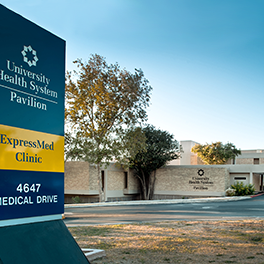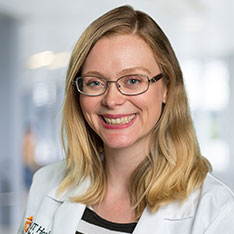At University Health, our speech and language pathologists (SLPs) are trained to address speech conditions in adults and children. In children, early detection and treatment is important to learning, feeding and communicating. We provide comprehensive evaluation including testing, development and implementation of a treatment plan to meet your needs.
Speech and language therapy consists of assessment and treatment of any condition related to speech, swallowing, language and cognition. Whether the condition is from trauma or from an illness, rehabilitation is critical to returning to school or work.
Conditions Treated With Speech & Language Therapy
- Aphasia happens when the area of your brain that controls language and comprehension is damaged. Aphasia often occurs after a stroke, head injury or brain tumor.
- Apraxia affects children from birth and prevents them from making sounds correctly. The brain and speech muscles have trouble working together to create speech.
- Difficulty swallowing can occur alongside a number of injuries or conditions. When the muscles in your mouth and throat aren’t working properly, it can be hard to eat. This might happen during cancer treatment or after a head injury or stroke.
- Dysarthria occurs when the muscles that produce speech are impaired, weakened or paralyzed. A person with dysarthria may sound like their speech is slurred. Dysarthria may be caused by Parkinson’s disease, stroke or multiple sclerosis.
- Orofacial disorders can affect your ability to eat, talk, swallow and breathe. Your speech language pathologist might work with your dentist or orthodontist to treat you.
- Speech sound disorders often occur in children. Children with this condition have difficulty making certain sounds, which can make it hard to understand what they’re saying.
- Stuttering is a fluency disorder that disrupts the flow of your speech. If you have a stutter, you might say parts of a word or a whole word more than once. This can make it sound like you are trying to make a certain sound or word but it won’t come out.
These conditions can result from
- Cleft lip and palate
- Dementia
- Language-based learning disabilities
- Neurological diseases
- Oral and laryngeal cancer
- Preschool language and speech delays/disorders
- Stroke
- Traumatic brain injury
Speech & Language Therapy Services
Depending on the nature of your condition, your speech language pathologist will recommend a treatment plan. This might include muscle strengthening exercises or practice making certain vocal sounds.Services we provide
- Parkinson Voice Project’s SPEAK OUT!® & LOUD Crowd®
- Cognitive evaluation, treatment and retraining
- Videofluoroscopic Swallow Studies (VFSS), also known as Modified Barium Swallow Study (MBSS)
- Fiberoptic Endoscopic Evaluation of Swallowing (FEES)
- Neuromuscular Electrical Stimulation (NMES)
- Language and articulation evaluation and therapy
- Pediatric evaluation and therapy
- Use of voice prosthesis
- Voice restoration after total surgical removal of the larynx
- Fluency evaluation and treatment
- Pediatric feeding therapy
Benefits of Speech & Language Therapy
Speech and language therapy can have a huge, positive impact on your quality of life. If you have a speech disorder, communicating can be challenging and sometimes impossible. But with the help of a therapist, you will be able to comfortably and confidently communicate your ideas and feelings.
Diagnosing a Speech Language Disorder
Sometimes, identifying a speech language disorder is as easy as listening to someone’s speech. To diagnose a specific disorder, your SLP may perform more tests to understand your speech, cognition and the structure of your mouth and throat.
Some common tests include:
- Checking vocal folds with a lighted tube passed through the voice box. This will help determine if the folds are moving abnormally during speech. This is usually performed by an ear, nose and throat doctor.
- Hearing tests to determine whether hearing loss is affecting your ability to understand words correctly.
- Laryngoscopy looks inside your throat to see if the throat’s structure is contributing to a speech problem. Your doctor will use a light and mirror to see the reflection of your throat, or will insert a small, lighted scope through your nose to access your throat.
- Oral-mechanism exam examines your face, jaw and teeth, lips, tongue, pharynx and soft and hard palates. This helps determine if there is a physical element causing the condition.
- Stroboscopy records how your vocal cords vibrate during speech, using a strobe light to show this movement.
Certified Speech Language Pathologists
Speech pathologists at University Health have either completed advanced study in a specific field, have additional certification and/or have significant experience to address the needs of all patients.
We are committed to helping you achieve positive outcomes in communication and swallowing function.



